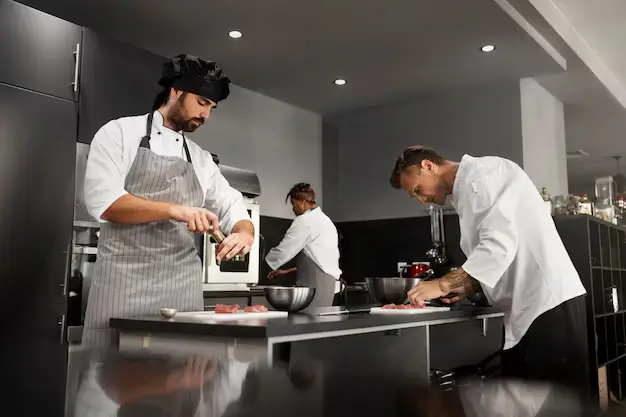There’s something oddly comforting about supermarket food shows. The clatter of pans. The controlled chaos. The quiet hum of everyday ingredients doing extraordinary things. But ALDI SÜD’s latest venture into digital food entertainment isn’t just comforting—it’s calculated, confident, and refreshingly fun.
With Like a Gourmet: Kitchen Games, launched on June 11, the German discounter has taken a daring leap into content marketing—one that’s more creator kitchen studio than commercial.
But don’t be fooled by the branded setting. This isn’t just an ad with nice lighting. It’s a signal that retail media is growing up—and ALDI is doing what few supermarkets have dared to do: hand over the reins to the people who already own the internet.
The Format: Four Creators. Four Hours. Four Courses. All ALDI.
The structure is elegant in its simplicity. Four content creators—names that ring bells in Germany’s foodie corners: Hanna Reder, Mike Braunmüller, Alexander Joseph, and Mona Hiermaier—are given four hours to prepare a four-course menu using nothing but ALDI’s own-brand products. And yes, they have to stick to ALDI prices.
Each creator gets their moment in the spotlight. The others sit out, watching from the sidelines. But this isn’t MasterChef—there’s no Gordon Ramsay-style yelling, no teary eliminations. What we get instead is gentle chaos: creators battling time, ingredients, and something called a Kitchen Games Joker—a light-hearted sabotage, like banning salt and pepper or forcing contestants to wear oven gloves throughout.
The vibe? More bake sale than bloodsport.
And it works.
No Judges. Just the Crowd.
Perhaps the boldest move here is in the judging: there isn’t any. No Michelin-star panel. No stern deliberation over plating techniques. Instead, the public decides.
The most “socially viral” menu—measured in likes, shares, comments, and saves—wins.
It’s democracy via dopamine. And it’s cleverly designed for platforms like Instagram and TikTok, where food is as much about aesthetics and relatability as it is about culinary merit.
By giving the audience ownership, ALDI flips the script. This isn’t about perfection. It’s about engagement.
So What’s Actually New Here?
Let’s be honest: cooking competitions are nothing new. From Iron Chef to Guy’s Grocery Games, food TV has been weaponising time limits and curveball ingredients for decades.
But ALDI’s version is quietly radical in three ways:
It’s built entirely around own-brand products. This isn’t a show that just happens to be sponsored by ALDI—it is ALDI. The format is an advertisement, sure, but it’s smart, self-aware, and not remotely cringe.
It hands creative control to influencers. These aren’t trained chefs or actors—these are people with real digital reach, and ALDI trusts them to carry the show. It’s an implicit endorsement of the creator economy.
It doesn’t pretend to be impartial. No need to impress a silent judging panel. Just impress the internet.
In short: Kitchen Games doesn’t break the rules. It rewrites the entire playbook.
How Does It Stack Up Against the Big Names?
Let’s measure this properly. On one end, we have Cutthroat Kitchen—chaotic, aggressive, drenched in sabotage and snark. On the other, there’s Guy’s Grocery Games—a fan-favorite but ultimately still trapped in cable TV’s formulaic grip.
Kitchen Games sits somewhere different.
It’s not interested in belittling contestants or elevating culinary snobbery. It’s not playing for prime-time prestige. It’s playing for comments. For duets. For TikTok recreations.
It’s retail theatre—with a face filter.
And crucially, it’s platform-native. You don’t need to carve out an hour on the sofa. You can watch it on the train. While eating lunch. Or while cooking that exact dish from the ALDI site.
That’s a marketing dream.
Let’s Talk Strategy: Why ALDI Did This Now
The timing isn’t accidental. Grocery retail in 2025 is no longer just about price and location—it’s about visibility. Supermarkets are fighting not just for shelf space, but for screen space. And ALDI knows this.
Launching Kitchen Games gives them a triple advantage:
Content control: They own the show, the platform, and the product.
Audience acquisition: Each creator brings their own community.
Cultural capital: ALDI positions itself not just as a discounter, but as a lifestyle brand.
The show isn’t just selling groceries—it’s selling relevance.
“This is a smart fusion of retail strategy and creator-led storytelling,” says Sabine Keller, a retail media strategist based in Berlin. “ALDI has created a format where the audience, not the ad budget, drives momentum—and that’s exactly what brands need in 2025.”
The Production Powerhouse Behind It
This isn’t a DIY TikTok. Kitchen Games is produced by Glutamat, with creative direction from ODALINE, and boosted by The Nerds, a content amplification team who know how to seed virality without forcing it.
The polish is evident—but so is the looseness. You never feel like you’re being sold something, even though you are. It’s that rarest of things: a branded show that feels like a creator collab.
And it shows—early videos on YouTube and Instagram have already begun drawing thousands of views and hundreds of user interactions, indicating real community traction rather than forced engagement.
What’s Next?
With only four episodes announced, ALDI is testing the waters. But the potential is enormous:
Spin-offs: Could we see “Back to School Kitchen Games”? “Holiday Specials”? “Kids’ Edition”?
International formats: This is built to scale. ALDI Nord, UK, Australia—anywhere.
Shoppable integration: Imagine clicking directly from a recipe to an ALDI order. It’s not far off.
This could very well be a new category of retail programming—call it “Shop-ertainment,” if you will.
Final Take
In an age of hyper-curated perfection, Like a Gourmet: Kitchen Games is disarmingly real. It’s fun. It’s fast. It’s filled with moments that feel like something your friend might post—not a network exec.
But make no mistake: this is strategic entertainment.
It’s what happens when a grocery chain stops shouting prices and starts telling stories.
And if that story involves a four-course dinner, oven mitts, and a ban on salt—well, we’re here for it.



